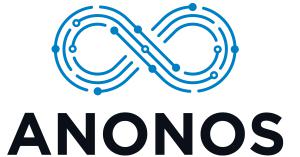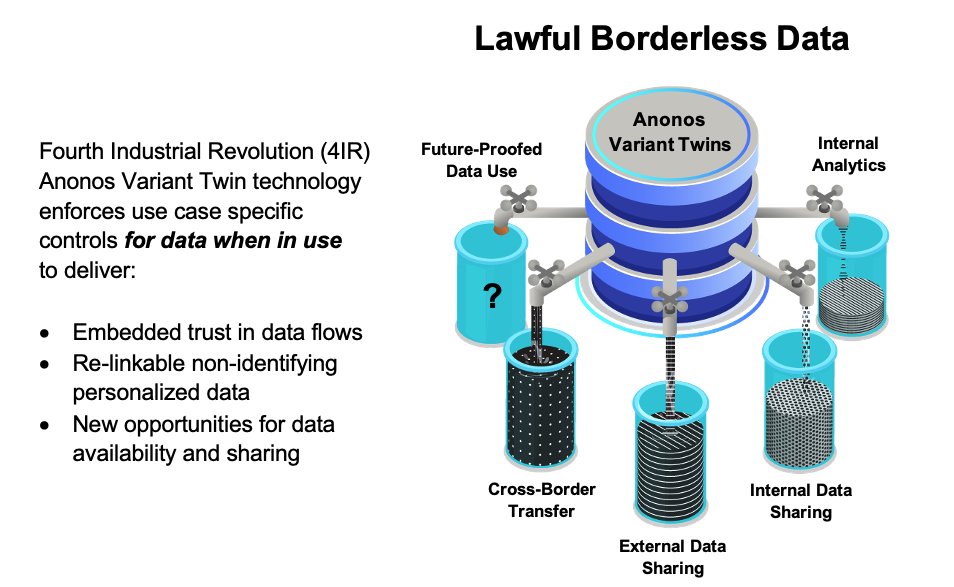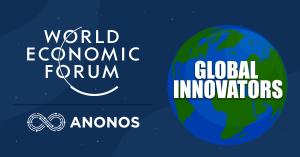
Anonos Becomes World Economic Forum Global Innovator as a Fourth Industrial Revolution Data Protection Technology Expert
Organisations must embrace advanced data protection techniques to effectively control the analytics, artificial intelligence (AI) and machine learning (ML) that now begin to blur our physical, digital, and biological data-driven worlds. This phenomenon, known as the Fourth Industrial Revolution, is the force behind many data-driven products and services quickly becoming indispensable to modern life.
“Harnessing the benefits of the technologies of the Fourth Industrial Revolution (4IR) relies upon equitable access to data, but although there is now an unprecedented amount of data flows across devices and borders, the regulatory environment for data access and use remains somewhat fractured,” said Anne Josephine Flanagan, Data Policy & Governance Lead at the World Economic Forum. “We welcome Anonos as a member of our Global Innovators Community, serving as a key contributor on our projects seeking workable solutions to build trust in data flows. By enforcing data use policies using 4IR technology, Anonos brings great experience and expertise in this space and we look forward to their participation in this important work.”
“The methods and purposes of data processing have changed dramatically over the last several decades. Ongoing technology developments make it easier to switch seamlessly from transactional (primary purpose) data collection and processing, to advanced analytics, AI and ML,” said Gary LaFever, CEO and General Counsel of Anonos. “While Big Data processing advanced these technologies, Privacy Enhancing Techniques (PETs) failed to keep pace.”
First-Generation PETs focus on limiting unauthorised parties from gaining access to data using encryption and other security techniques that protect data when it is in transit and at rest. These PETs protect data in use by limiting processing to restricted enclaves (i.e., within established perimeters). All parties agree to the restricted use of data processed in the clear. However, data in the clear is vulnerable to external “hacks” and misuse by parties violating the terms of contracts. When these contracts are breached, more than the contracting parties are affected - individual data subjects are as well.
Second-Generation PETs like anonymisation (via data suppression, perturbation, generalisation, etc.) and, most recently, differential privacy, were developed to overcome these limitations. However, due to anonymisation and differential privacy restrictions in preserving utility while still providing sufficient protection to make data shareable, these techniques work only if centralised controls exist over the use of data.
Third-Generation PETs (like Synthetic Data and Homomorphic Encryption) are being developed for decentralised data sharing, combining and processing. While Synthetic Data helps facilitate privacy-respectful decentralised processing, it does not enable relinking to identity for longitudinal studies, nor the ability to contact at-risk study participants. While advances are being made in Homomorphic Encryption, its high computational overhead and extended processing times result in a high carbon footprint making it impracticable for sophisticated decentralised data processing, sharing, combining, relinking or longitudinal studies in the near future.
“Accelerating the responsible exchange and use of data can solve critical challenges and fuel innovation for society,” said Nadia Hewett, lead for the Data for Common Purpose Initiative (DCPI) at the World Economic Forum. “We welcome Anonos to DCPI, a first-of-its kind global initiative focused on designing a governance framework to responsibly enhance the societal benefit from data. Anonos’ technology that allows for re-linkable, non-identifying personalized data, shows how advances in technology make our ability to leverage data for better outcomes plausible today. Bringing together leaders from technology startups and scaleups with other players, such as governments, academic institutions and civil society, is essential in realizing the potential of data while respecting the rights of the individual parties involved.”
“Anonos’ subject matter expertise in developing and deploying innovative 4IR data protection technology, overcomes the limitations of First, Second and Third-Generation PETs. Anonos Variant Twin technology resolves today’s – and tomorrow’s – legal challenges, enabling the unlocking of data’s commercial and societal value,” added Gary LaFever. “Anonos Variant Twins enable functional separation of information value from identity to technically enforce policies to enable a gradation of the types of data you can provide, allowing organisations to share everything from no data to a lot of data, any volume or identifiability of data.”
Gartner Group recognised Anonos as a Gartner Cool Vendor because its patented “Variant Twins” create controllably re-linkable yet non-identifiable accurate data sets from personalised data. This enables compliant dynamic data sharing, combining analytics, AI and ML without loss of accuracy or utility.
“The World Economic Forum’s Empowered Data Societies project, a collaboration with the Finnish government and the City of Helsinki, is looking at how a human-centric model could improve data availability to empower communities and societies,” said Julie Ziskind, Platform Curator for the Forum’s Centre for the Fourth Industrial Revolution’s (C4IR) Data Policy Platform. “We’re delighted to have Anonos contribute their unique perspective to our multi-stakeholder community of experts from academia, business, civil society and government, in exploring ways to build healthy data relationships, supporting data-driven innovation while respecting privacy and individual choice.”
About the Forum:
The World Economic Forum is the International Organization for Public-Private Cooperation. The Forum engages the foremost political, business, cultural, and other society leaders to shape global, regional, and industry agendas. It was established in 1971 as a not-for-profit foundation and is headquartered in Geneva, Switzerland. It is independent, impartial and not tied to any special interests. The Global Innovators Community is a group of the world’s most promising start-ups and scale-ups at the forefront of technological and business model innovation. The World Economic Forum provides the Global Innovators Community with a platform to engage with the public and private sector leaders and contribute new solutions to overcome current crises and build future resiliency. Companies invited to become Global Innovators will engage with one or more of the Forum’s Platforms, as relevant, to help define the global agenda on critical issues.
About Anonos:
Data is the world’s most precious resource, and its value is only truly realised when it’s shared and combined with other data sets. Anonos empowers organisations with more opportunities for sustainable data use by protecting it at rest, in transit, and in use, both now and in the future. Anonos recognises that protecting data privacy is about more than just compliance: the team has invested over eight years and tens of thousands of hours into solutions that anticipate what’s next in global data use and regulation. The only software to utilise GDPR-compliant Pseudonymisation and patented relinking techniques, Anonos Variant Twins make it possible to legally analyse, combine, and use data both inside and outside of organisations. Anonos’ ingenious, future-proof technology lays a foundation for today’s data-driven society, enabling organisations, municipalities, and countries to gain control over data to make lawful and efficient sharing possible. With more accurate understanding, data-driven insights can more easily guide and shape the future.
Liberty Communications
on behalf of Anonos
email us here
Visit us on social media:
Twitter
LinkedIn
EIN Presswire does not exercise editorial control over third-party content provided, uploaded, published, or distributed by users of EIN Presswire. We are a distributor, not a publisher, of 3rd party content. Such content may contain the views, opinions, statements, offers, and other material of the respective users, suppliers, participants, or authors.




